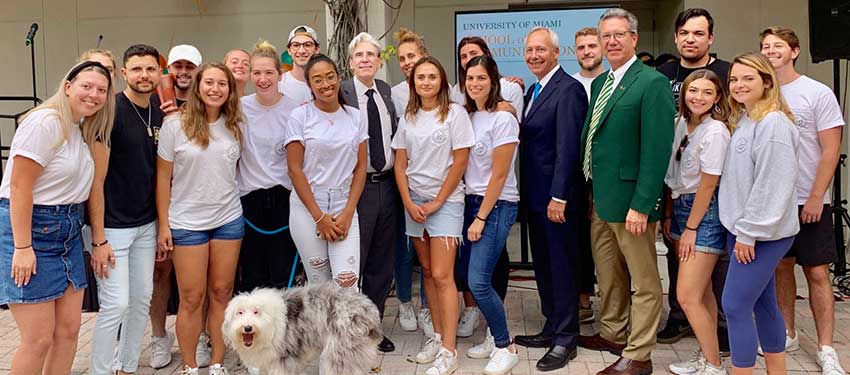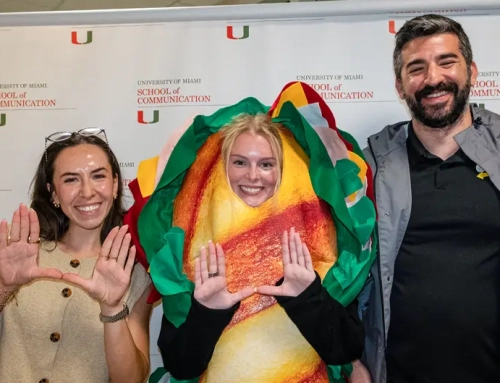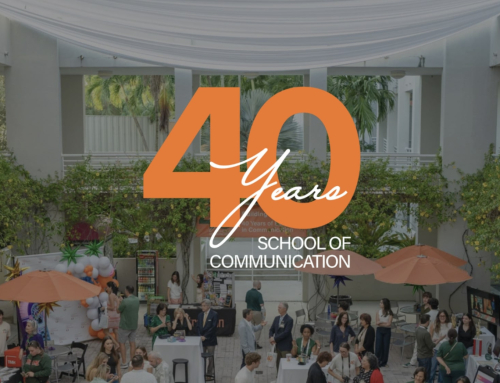By: Karina Valdes
The University of Miami School of Communication is bidding its beloved dean farewell. Dr. Gregory J. Shepherd, the third dean of the School of Communication, is retiring after eight years of transformational leadership and more than 40 years of service as a distinguished faculty member and administrator at several major universities.
“Dean Shepherd has, first and foremost, been a great role model for the School of Communication,” said University of Miami President Dr. Julio Frenk. “He has brought the School to the forefront of innovation. On everything from infrastructure to new areas of study to opportunities for immersive learning, he has exercised a visionary style of leadership.”
When Shepherd’s tenure at the School of Communication began in July of 2011, the communication landscape was vastly different. Social media was booming that year with snapchat launching and Instagram turning just one year old. Both platforms forever changed the way people share ideas and created unforeseen opportunities for communication students. Through Shepherd’s leadership and gifted foresight, the School of Communication was positioned to respond and adapt to those changes.
Shepherd’s first significant undertaking was to work with the faculty to eliminate restrictions that limited the areas of study students could major or minor in. At that time, the School’s accrediting body, the Accrediting Council on Education in Journalism and Mass Communications (ACEJMC), required students to earn a second major in a program outside of the School, in the College of Arts and Sciences. This rule prevented students from pursuing complementary programs in areas that reinforced their major, including programs in the Miami Business School. With support from the faculty, Shepherd opted out of the School’s accrediting body, a lead other major universities have since followed. Before discontinuing the relationship with ACEJMC, the School passed its accreditation review, proving its standards for education were at the level indicated by the accrediting body.
“ACEJMC was so constraining and it wasn’t future-oriented. It was, to me, one of the great decisions the faculty of the school made,” said Shepherd.
The move away from ACEJMC created opportunities for interdisciplinary work, granting students a more holistic education.
“Shepherd was instrumental in removing curriculum constraints that limited the students’ ability to study in different departments across the School and University. Due to his efforts, students have more freedom in their educational pursuits,” said Dr. Paul Driscoll, vice dean for academic affairs.
Shepherd understood how the communication discipline was evolving in response to technology, society, and countless other factors. He ensured the School adapted on various fronts from its curriculum and organizational structure to infrastructure and student opportunities. Initially a Dean of seven programs, he guided the School through its largest reorganization in its history by eliminating the programs and creating four departments- Cinema and Interactive Media, Communication Studies, Journalism and Media Management, and Strategic Communication- each headed by a department chair. Departmentalizing gave faculty more opportunities for guiding the direction of their department and allowed for more careful deliberations and decision-making within their respective areas.
“This was an undepartmentalized School which meant that literally every faculty member reported directly to the dean. It was a very centralized administrative structure. There were many reasons for departmentalizing, but the primary reason was to bring decision making down and closer to the faculty,” said Shepherd.
In the eight years since Shepherd’s appointment as Dean, the communication field continued to experience tremendous growth, permeating atypical areas such as gaming and mobile application development.
In response to the dynamic communication field, the School grew its offerings under Shepherd’s direction and added undergraduate majors in Interactive Media and Media Management; minors in Game Design, Health Communication, and Interactive Media; and graduate programs in Interactive Media and Media Management.
“Shepherd recognized that new forms of communication were playing an ever more important role in our field and was instrumental in the creation of the Interactive Media program. He supported the program at every step and played a critical role in bringing in new interdisciplinary faculty who were transformational to the program,” said Kim Grinfeder, director of the Interactive Media program.
Before taking on the role of dean of the School of Communication, Shepherd was Dean of Scripps College of Communication at Ohio University where he oversaw the establishment of the Game Research and Immersive Design (GRID) Lab, a highly successful game design lab with a focus on developing skills in simulations, computer animations, VR, and other interactive digital media.
“When I got to the School of Communication there was none of that. Two of my very first hires that I made were game designers because I believe that everything that now goes into the barrel of interactive media was where the disciplines were going and that educating students in those areas was going to be necessary to students across career paths,” said Shepherd.
With advances in interactive media pervading the communication field, Shepherd recognized the need for students to have the opportunity to major or minor in the discipline. He worked with Grinfeder on developing the Interactive Media graduate program and developed it into a Master of Fine Arts (M.F.A.), a terminal degree that is a university credential for teaching, giving students greater professional opportunities upon graduating. Since its inception in 2013, the Interactive Media M.F.A. program has consistently ranked on The Princeton Review’s list for the Top 25 Graduate Programs for Game Design.
“I will say another important piece of this is the Interactive Media program has thrived in part by being a truly interdisciplinary driven group. They work closely with faculty across this School and now increasingly with faculty across the University,” said Shepherd.
That interdisciplinary component was the driving force behind another major element of the School Shepherd was instrumental in forming; The Center for Communication, Culture and Change (4C). The 4C is the School’s research hub that focuses on using communication for social and behavioral change and houses two Knight Chairs. Faculty researchers working with the 4C receive support to carry out their work, including 4C Pilot Grants which are awarded three times per year to fund interdisciplinary projects that align with the center’s mission. Faculty working with the 4C have produced compelling research, furthering the University’s mission.
“The 4C, our research center, has done a really good job of partnering in research projects both interdisciplinary within the school, but also again increasingly outside the school,” said Shepherd.
Through his leadership, Shepherd unequivocally revolutionized the School by creating more opportunities for interdisciplinary study and focusing on research, positioning its graduates at the forefront of numerous disciplines. He also championed for students to have a diverse set of experiential opportunities. He spearheaded the construction of the Koenigsberg and Nadal Interactive Media Center (IMC), a state-of-the-art space for innovation and creativity that is transforming hands-on education at the University. The IMC is home to Orange Umbrella Student Consultancy, a full-service multimedia consultancy where students create, learn, and expand their portfolios.
“Dean Shepherd’s unending commitment to giving students the best possible education at the University of Miami is the foundation for Orange Umbrella and our success. We are built on his passion for bringing experiential educational opportunities to the students at the School of Communication. We simply could not exist and thrive without his vision and his support,” said Melissa Jane Barnes, managing director for Orange Umbrella.
Students working for Orange Umbrella offer a variety of communication services to clients including public relations, advertising, interactive media, film production, research, and web design.
As Shepherd retires, he leaves a legacy of dynamic opportunities for students. To honor his eight years as Dean of the School of Communication, a new fund was established by the University in his and his wife’s name. The Greg and Mary Shepherd Experiential Learning Endowed Fund was created to offer support to School of Communication students with financial need who wish to participate in programs that provide applied learning opportunities.
“I think it’s the future of higher education and that future is now. Active learning, participation, learning from one another, and all of that is so important. It’s also driven by the work world that is increasingly project based and team based,” said Shepherd.
After helping numerous students with financial need take part in programs they otherwise would not be able to afford, the fund was established to continue Shepherd’s legacy. The fund is a testament to Shepherd’s belief that all students should be able to participate in experiences that enhance their education, regardless of their means. Students with financial need can receive assistance for internships, job shadowing, and conferences, just to name a few of the endeavors this new fund will support. Shepherd, and his wife, Mary, made the initial gift to the fund, with many alumni, parents, and friends of the School of Communication contributing as well.
As Shepherd’s final days as Dean near, he is looking forward to traveling and spending time with his wife. Although he is stepping down as Dean, Shepherd will still be on campus working with the Provost’s office on certain initiatives to further the mission of the University. He takes with him fond memories of the faculty and staff.
“While I am certainly proud of the programs we have built, the changes we have enacted, the spaces we have built, the teaching and research we have done, and so much more, I am most proud of the community we have built in the School of Communication. We who work in the School do so truly as colleagues and friends, in support of one another, knowing that is how we will best pursue our mission,” said Shepherd.
To watch the video commemorating Dean Shepherd, please visit https://vimeo.com/331858913/96f3197b09.







